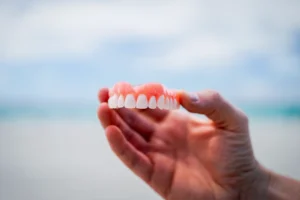It is possible to eat a healthy, varied diet with dentures.
If you have decided to go ahead and have dentures placed, you may be wondering how the treatment will impact your diet. While you will have to make a few adjustments, the good news is that it is definitely possible to enjoy a balanced and delicious diet with your new appliances. Read on for our tips on eating with dentures and what you should know about your dietary choices once you have replaced your missing teeth.
1. Start off slow
It can take a little time to really get used to your dentures, and you may find it helpful to start off by eating soft foods that are easy to chew. It is also a good idea to cut your food into small, manageable pieces before eating — slicing certain foods into thin strips is often helpful. When you chew, try to use both sides of your mouth to distribute the pressure as evenly as possible and chew slowly to avoid discomfort.
2. Take care when biting
Once you have adjusted to the feeling of your new dentures, you will be able to eat a varied diet that includes most of your favourite foods. That said, it is important to understand that you will need to take care when biting down on certain foods. If, for example, you need to bite on a piece of apple, it is advisable that you use your canines rather than your front teeth. If you bite down using your front teeth, there is the risk that your dentures will move around. This, in turn, can lead to gum pain.
3. Don’t eat sticky and hard foods
With time, eating with your dentures will become easier and more comfortable, and you will be able to eat a variety of different foods. There are, however, a few foods that should be completely avoided while you have dentures. These include hard and sticky foods, as these can cause damage to your dentures. Examples include nut butters, sticky and hard candies, whole nuts, popcorn, raw vegetables like carrots and corn on the cob, and tough meats that require a lot of chewing. It is also advisable that you avoid foods that can get stuck underneath your dentures and cause irritation — these include small seeds such as the sesame seeds often found in pieces of bread and rolls.
4. Enjoy a nutritious diet
While there are a few foods that are best avoided with dentures, it is certainly possible to enjoy a healthy, balanced diet that is rich in nutrients and beneficial to your oral and overall health. The good news is that there are plenty of substitutions available for the foods you can’t eat. Nut butters, for example, should be avoided but can be replaced with protein-rich hummus; tough meats can be easily switched out for tender, slow-cooked meat, as well as ground meat. Whole apples and crunchy veggies sticks might be a no-no, but soft, ripe fruits like bananas, mangoes, and peaches are easy to eat and just as delicious.
How can we help?
At Impressions Dental Studio, we offer a broad range of dentures to suit our patients’ needs. If you would like to replace missing teeth and enjoy improved oral health, we encourage you to come in and see us so that we can discuss your options with you.
Some of the denture services that we offer include partial dentures, removable dentures, immediate dentures, precision dentures, and standard dentures. We also offer advice and information regarding oral hygiene and proper denture maintenance and are available to address any questions or concerns that you might have.
To find out more about the services we offer at Impressions Dental Studio, please have a look here. If you would like to book an appointment, give us a call at 1300 85 20 30 or please get in touch here.






